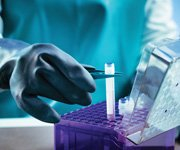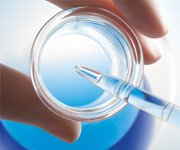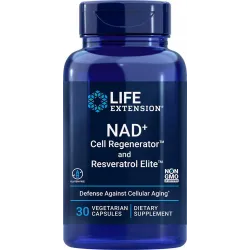NAD+ Promotes Stem Cell Renewal and Regenerates Mitochondria
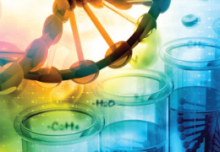 Life Extension® receives many inquiries about stem cell infusion therapies offered in the United States and other countries.
Life Extension® receives many inquiries about stem cell infusion therapies offered in the United States and other countries.
Our current view from small human trials is that there may be a benefit to infusions of exosomes that are naturally secreted from healthy stem cells.
Stem cell exosomes have regenerative properties that help restore functional cells needed to maintain tissue and organ viability.
Overlooked when considering exosome treatments is the ability to rejuvenate existing stem cell pools utilizing approaches many of you already follow.
This includes activating AMPK and restoring youthful levels of sirtuins and NAD+.
Increasing NAD+ is a promising way to self-renew existing stem cells in order to extend lifespan and prevent disease.1-12
A study published in June 2019 shows how a NAD+ boosting supplement called nicotinamide riboside increased stem cell colonies by 75% in the gut of aging mice.13
Other studies point to the role of NAD+ in restoring circadian rhythms needed for restorative sleep.14
Age-related sleep deterioration and digestive disorders adversely impact quality of life and accelerate degenerative processes in older individuals.
The most critical role of NAD+ is DNA repair. Each day, our DNA sustains numerous breaks that are repaired by NAD+-dependent enzymes.
With age, NAD+ levels plummet. Another study published in 2019 showed that a modest dose of nicotinamide riboside boosted NAD+ levels by 51% in overweight humans.15
We advise holding off on most stem cell infusions until more is known about safety and efficacy.
New data reveal how NAD+ improves functionality of existing stem cells and replenishes mitochondria in cells throughout the body.
What is NAD+?
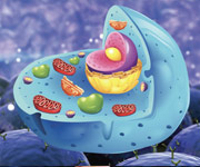 Nicotinamide adenine dinucleotide (NAD+) is a compound found in every living cell.
Nicotinamide adenine dinucleotide (NAD+) is a compound found in every living cell.
It is critical for cell energy production. Recent research shows NAD+ does much more.6,8-11,16,17
Hundreds of different proteins in each cell require NAD+ to work properly.17
The most important proteins are the sirtuins, cellular guardians that protect against DNA damage that leads to many age-related ailments.18,19
Sirtuins are an important target for anti-aging interventions.10,11,20-22 Multiple animal studies have demonstrated that increasing sirtuin activity leads to longer life and reduction in age-related loss of function.12,23,24
As NAD+ levels decline with aging, there is reduced sirtuin activity. Boosting NAD+ helps ramp up sirtuin activity.
Increasing NAD+ levels can bring additional benefits tied to healthy longevity including:20,25
WE RETAIN STEM CELLS AS WE AGE
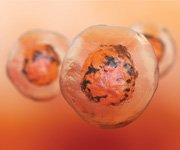 Stem cells are capable of self-renewal.
Stem cells are capable of self-renewal.- Stem cells differentiate into functional (somatic) tissue cells.
- The number of stem cells may not greatly decrease with age.
- Aging reduces regenerative potential of stem cells.
- Stem cell senescence contributes to age-related conditions.
Khorraminejad-Shirazi M, et al. Aging and stem cell therapy: AMPK as an applicable pharmacological target for rejuvenation of aged stem cells and achieving efficacy in stem cell therapy. Hematol Oncol Stem Cell Ther (2017).
HOW OLD STEM CELLS MAY BE REJUVENATED
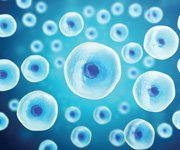 Boost cellular AMPK
Boost cellular AMPK- AMPK lowers excess mTORC1
- Replenish NAD+ cell levels
- Activate sirtuins (with resveratrol)
Khorraminejad-Shirazi M, et al. Aging and stem cell therapy: AMPK as an applicable pharmacological target for rejuvenation of aged stem cells and achieving efficacy in stem cell therapy.Hematol Oncol Stem Cell Ther (2017).
Nicotinamide Riboside Boosts NAD+
Higher levels of NAD+ correlate with improved health and a lower occurrence of age-related disorders.
Lower NAD+ levels contribute to many diseases of older age, including sleep disturbances, metabolic disorders, diabetes, cardiovascular disease, and cognitive decline.7,9-11,14,26
An easy way to boost NAD+ levels is with nicotinamide riboside, which converts to NAD+ in your body.
In human subjects, a 300 mg dose of nicotinamide riboside increased red blood cell NAD+ levels by 51%.15
Nicotinamide riboside is highly absorbable, or bioavailable, when taken orally.27
NICOTINAMIDE RIBOSIDE AND RESVERATROL: A POWERFUL ANTI-AGING DUO
 Resveratrol is a plant compound found in red grapes, red wine, and other darkly colored fruits.
Resveratrol is a plant compound found in red grapes, red wine, and other darkly colored fruits.
Among its many benefits, it activates sirtuins, the key defender proteins linked to longer, healthier life.47-49
But resveratrol can’t do this if cells are low in NAD+.That’s because NAD+ is required for sirtuins to work properly. It would be like pressing the accelerator in your car when your gas tank is empty.
The solution is to increase intake of nicotinamide riboside to boost NAD+ levels at the same time as promoting sirtuin activity with resveratrol. This combination ensures that the enhanced sirtuin activity can have its maximum beneficial effect on health and aging.
Remarkable New Findings
Recent studies of NAD+ and nicotinamide riboside have shown two primary ways in which they improve health.
1. Replacing Old Mitochondria and Improving Mitochondrial Function
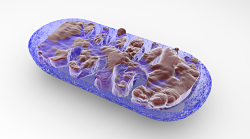 Mitochondria are the power suppliers of every cell, breaking down nutrients like sugars and fats into energy the cell can use to do work. When mitochondria age, they become dysfunctional, contributing to many illnesses.
Mitochondria are the power suppliers of every cell, breaking down nutrients like sugars and fats into energy the cell can use to do work. When mitochondria age, they become dysfunctional, contributing to many illnesses.
Evidence indicates that sirtuins perform cellular housekeeping that includes replacing old and damaged mitochondria with healthy, new ones.28 This process rejuvenates cells and improves their metabolism while maintaining their optimal function.
Because sirtuin activity is dependent on NAD+ (which plummets with age), supplementation with nicotinamide riboside can help preserve cellular functions.
Replenishing NAD+ levels with nicotinamide riboside resulted in enhanced mitochondrial function that:
-
Rejuvenated aging bone marrow cells, helping to maintain immune function and prevent bone marrow failure and related diseases,29,30
-
Improved muscle function and reduced muscle pathology in an animal model of muscular dystrophy,31 and
-
Lessened liver inflammation and induced mitochondrial biogenesis, the formation of new mitochondria, in mice liver cells.32
2. Rejuvenating Stem Cells
 Healthy stem cells in tissues are needed to replace dead or dying functional cells with new ones. But stem cells age and become dysfunctional over time, causing tissues to deteriorate and increasing risk for disease.33
Healthy stem cells in tissues are needed to replace dead or dying functional cells with new ones. But stem cells age and become dysfunctional over time, causing tissues to deteriorate and increasing risk for disease.33
Nicotinamide riboside intake can help prevent this. In a study on elderly mice, nicotinamide riboside replenished NAD+ levels, which improved mitochondria function that rejuvenated stem cells in muscles. It also prevented the deterioration of muscle, skin, and brain stem cells.24
This prolonged the lifespan of old mice by approximately 5%. Though this number may not seem huge, the supplementation only began when the mice were already two years old, the equivalent of about 80 years in humans.34
A more significant effect may occur if NAD+ is boosted earlier in life, and combined with interventions like resveratrol that prompts cells to express sirtuin proteins that NAD+ then activates.
New studies corroborate a beneficial impact of NAD+ on other stem cells.13,29 In one study, researchers looked at adult mice gut stem cells, which typically dwindle in older age.13 Injuries to the gut of these older animals have a difficult time healing.
Nicotinamide riboside increased these digestive tract stem cell colonies by approximately 75%, improving the ability to recover from injury. This finding has favorable implications for older individuals suffering from digestive tract discomforts.
-
 NAD+ (nicotinamide adenine dinucleotide) is an essential cofactor for hundreds of cellular processes.
NAD+ (nicotinamide adenine dinucleotide) is an essential cofactor for hundreds of cellular processes. -
Sirtuins, cellular defenders linked to longer life and protection from disease, require optimal NAD+ levels to function.
-
Levels of NAD+ drop with age, accelerating aging. Nicotinamide riboside helps replenish NAD+ levels.
-
Boosting NAD+ has been tied to improved mitochondrial function, healthier stem cells that rejuvenate tissues, and increased longevity.
-
Maximizing NAD+ also protects tissues from the effects of age and may reduce risk for age-related diseases such as cognitive decline, cardiovascular disease, and metabolic disease.
Wide-Ranging Benefits of NAD+
Boosting NAD+ levels can have a positive impact on multiple areas of health.
Longevity
Studying the effect of a supplement on human longevity is difficult, because of the long average lifespan of humans. But many studies show that increasing NAD+ prolongs the life of a variety of organisms.12,23,24,35
In yeast, a single-cell organism with a short lifespan, nicotinamide riboside increased lifespan as demonstrated by improved cell replicative capacity.23
Studies of worms show that nicotinamide riboside can prolong their life by at least 10%.35
These effects extend to mammals as well.12,24
Physical Performance
 In a recent study of older men, levels of NADH, the reduced form of NAD+ were significantly increased by 59% only two hours after taking one dose of nicotinamide riboside, while markers of oxidative stress were decreased.15
In a recent study of older men, levels of NADH, the reduced form of NAD+ were significantly increased by 59% only two hours after taking one dose of nicotinamide riboside, while markers of oxidative stress were decreased.15
The men in this study had an 8% improvement in peak isometric muscle torque (a measure of muscle force) and a 15% improvement in fatigue associated with exercise.
Brain Health
Studies of mouse models of Alzheimer’s disease have shown improvements with nicotinamide riboside supplementation.36,37
In the most recent study, it reversed the cognitive deficits in mice, improving memory.37 The pathology observed in the brains of Alzheimer’s disease patients, amyloid plaques, was also reduced in the brains of these animals. A previous study had similar findings.36
Obesity and Metabolic Disorders
Sirtuins improve metabolism and can be helpful guardians against weight gain, metabolic syndrome, and type II diabetes.38-43
By boosting sirtuin activity, nicotinamide riboside enhanced metabolism and prevented excessive weight gain in mice.44
In animal models of type II diabetes, this improved metabolism helped control blood sugar levels and shield against the damage done by high blood glucose.42
Cardiovascular Health
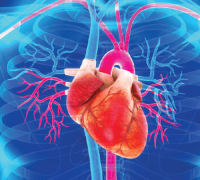 Improved metabolism and lower body weight help to reduce risk for cardiovascular disease.
Improved metabolism and lower body weight help to reduce risk for cardiovascular disease.
But nicotinamide riboside does even more to protect the cardiovascular system.
One recent study focused on mice with heart disease that had a 30% reduction in NAD+ levels.45 Untreated, they typically developed heart failure. But nicotinamide riboside attenuated the decline in cardiac function.
People aged 50 have about 40% less NAD+ whereas 80-year-old people can have 90%-98% lower levels of NAD+ compared to 21-year-olds.
Heart failure risk increases as people grow older.
Recent studies show that nicotinamide riboside protects the organs of the cardiovascular system and protects other tissues from the effects of cardiovascular disease.
Normally, if blood flow to a tissue is compromised due to disease, the tissue dies, as happens in a myocardial infarction or a stroke. Preclinical studies show that nicotinamide riboside improves the response of tissues to this type of injury, reducing damage and encouraging recovery of the tissue.5,46
NAD+ repletion improves mitochondrial and stem cell function and enhances lifespan in mice. Science. 2016 Jun 17;352(6292):1436-43.
How NAD+ Improves Sleep
It’s no secret that sleep patterns become disrupted with age.
Much of this problem is due to a disruption in circadian rhythms that govern our sleep/wake cycle.
NAD+ has shown the ability to rebalance circadian rhythms through its stimulation of a vital cell protein called SIRT1.
In an animal study, mice deficient in SIRT1 experienced decreased quality of sleep.14
Increasing NAD+ levels can help increase SIRT1 and other sirtuins, helping to restore normal sleep/wake cycles.
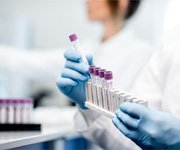 Adult stem cells lose ability to repopulate tissues with functional cells.
Adult stem cells lose ability to repopulate tissues with functional cells.- Systemic deterioration occurs as functional cells degenerate/die.
- How your stem cells may be renewed:
-
- Boost cellular AMPK
- Suppress excess mTORC1
- Replenish NAD+ cell levels
- Activate sirtuin proteins
Khorraminejad-Shirazi M, et al. Aging and stem cell therapy: AMPK as an applicable pharmacological target for rejuvenation of aged stem cells and achieving efficacy in stem cell therapy. Hematol Oncol Stem Cell Ther(2017).
Summary
NAD+ is a critical component of a healthy aging program.
Every cell requires it for hundreds of processes. These include activity of sirtuins, cellular guardians linked to prolonged lifespan and healthspan.
NAD+ levels and sirtuin expression diminish with advancing age, accelerating aging processes and degenerative disease risk.
Nicotinamide riboside is a compound that increases cellular NAD+ levels, enhancing sirtuin activity. New research has found that maintaining more youthful NAD+ levels can slow certain aspects of biological aging.
NAD+ also improves the health of stem cells that can replace dead and dying cells and keep vital tissues functioning.
This not only extends lifespan, but also helps reduce the risk for metabolic disease, obesity, cardiovascular disease, cognitive dysfunction, and more.
Material used with permission of Life Extension. All rights reserved.

